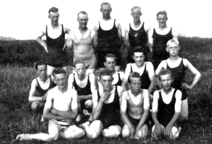I watched and admired a movie called “Rudy” several years ago. It’s the “true” story about a devoted Notre Dame football fan named Rudy Ruettiger, who saved up his money and enrolled in Notre Dame so he could try out for the football team. He tried out and practiced hard and trained with determination and sucked up to the entire football department for four years and got to be a second-stringer, without once getting a chance to play. Finally, in his last year, his teammates all threw their sweaters onto the coach’s desk and declared that they would not play if Rudy was not put onto the field. So he was allowed on the field– for one play– in the last minute of a game that was already decided.
I thought the film was intentionally funny. I thought it did a reasonably good job of showing how Rudy wasted four years of his life under a delusion. I thought most people watching the film would realize that if Rudy had devoted half the energy he gave to the Notre Dame football team to almost any other pursuit, he would have had something important and meaningful or even beautiful to show for it.
I thought it revealed that our so-called heroes– athletes, especially– inevitably use people like Rudy because that’s the way the system works.
Years later, I realized that I had it all wrong: it was meant seriously– Rudy was to be admired for wasting most of his college life waiting for a chance to play while he had none of the skills or attributes required to be a good player. He was a hero. He never quit. The lesson we were supposed to take away from this film was: never give up on your dreams.
Even if your dream is to flap your arms and fly, or marry Angelina Jolie, or be nominated to the Supreme Court.
Well, the one thing that didn’t occur to me was that most of the movie was pure hokum. It didn’t occur to me because I assumed that a film made of an unremarkable man who led really an unremarkable life would at least adhere to a few unremarkable facts.
The main “facts” are that Rudy tried out for the team, never got to play until the very last moment, and in that very short moment, had some peripheral involvement in a quarterback sack. The crowd did not know Rudy’s story and did not cheer wildly because he had just realized his dream (as if). They did not chant his name. The play-by-play announcer did not note his presence. The opposing quarter-back did not mutter, “who was that man!” under his breath (all right — I made that up — it wasn’t in the movie). He didn’t have a brother. The coach did not oppose him going into the game– in fact, he insisted on it. His team-mates never dropped their sweaters on the coach’s desk as a protest gesture against Rudy being denied a chance on the field.
Without those delusional Rudy’s out there– the losers in this scheme of things– how could we have winners?
So, aside from the facts, yes, it’s a true story. Does it still inspire you? I have an investment opportunity, if it does…
A real comment by a real fan of the film on IMDB:
If this movie doesn’t get you motivated, then something is wrong with you. This movie proves that good things happen to people who work hard and don’t except[sic] the circumstances they are dealt. I’ve seen this movie more than 30 times in my life, and i still cant get through the end of this movie without getting tears in my eyes. Another thing this movie teaches you is to listen to the people in your life who believe in you and want you to succeed, don’t listen to the people who want you to fail and constantly remind you that you are going to fail. “The best revenge is success.” One of my favorite quotes comes from this movie as well, when the coach dan devine tells rudy and the rest of the team that “Nobody, and i mean nobody, comes into our house and pushes us around.”
And thus the viewer becomes complicit in the hoax.

